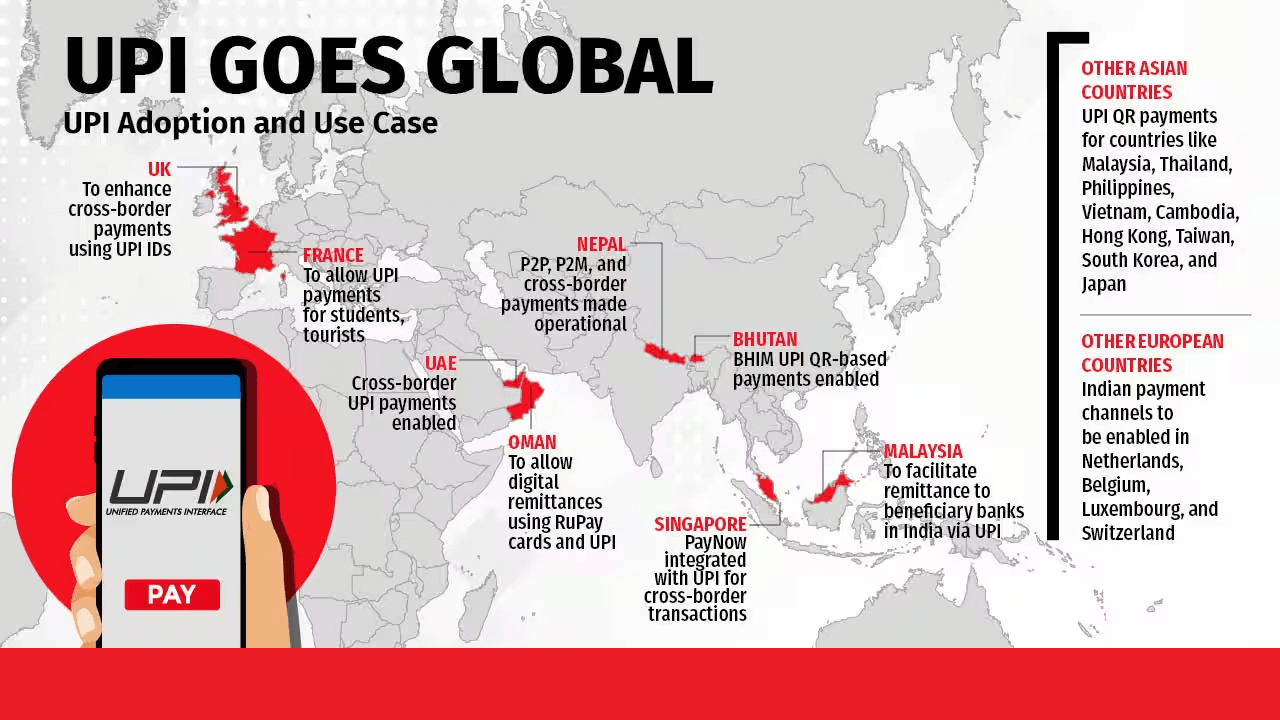During Prime Minister Narendra Modi’s state visit to France on July 13, 2023, India and France inked a historic agreement that allows Indian tourists to utilize India’s Unified Payments Interface (UPI) for transactions in rupees. This remarkable partnership marks a significant milestone as it introduces UPI, a highly popular mobile-based payment system, to Europe for the first time after its successful implementation in Singapore. The collaboration promises to revolutionize the payment experience for Indian tourists in France, eliminating the need for carrying foreign currency and providing unmatched convenience and adaptability.
- UPI’s Global Expansion: Embarking on a Global Journey From its inception, UPI has been progressively extending its presence worldwide through strategic alliances. With France becoming the latest country to embrace UPI for cross-border transactions, it joins the ranks of Singapore, Bhutan, Nepal, and the UAE, where UPI has already established itself successfully. Diverse countries, including France, UAE, Saudi Arabia, Bahrain, Singapore, Maldives, Bhutan, and Oman, have adopted various Indian payment systems, enabling Indian users to enjoy the benefits of UPI, RuPay, and other digital payment channels in these regions, streamlining transactions and enhancing convenience.
- NIPL: Forging Global Alliances The NPCI International Payments Limited (NIPL), established as a wholly-owned subsidiary of the National Payments Corporation of India (NPCI) in April 2020, plays a pivotal role in establishing partnerships with different countries to create an extensive acceptance network for RuPay and UPI. This extensive network empowers Indian travelers, allowing them to make payments using these digital payment channels in their destination countries, simplifying and streamlining their payment experiences.
- Empowering Indian Tourists with Effortless Transactions With the introduction of UPI in France, Indian tourists can now engage in seamless rupee transactions. They can make payments using local QR codes or UPI IDs, eliminating the need to carry and exchange foreign currency. This newfound convenience empowers tourists to spend according to their needs without the constraints of fixed foreign exchange amounts, providing them with unparalleled flexibility during their travels.
- Savings on Foreign Exchange Markup Charges Traditional international payments made with credit or debit cards often incur foreign exchange markup charges, which can be as high as 3.5% of the transaction amount, depending on the card’s features. While some financial institutions offer forex cards with lower markup fees, UPI payments in rupees present even greater savings. As transactions occur in rupees, there is no need for foreign currency conversion, ensuring a cost-effective payment solution and saving travelers from additional fees.
- UPI and the Liberalized Remittance Scheme (LRS) Travel-related expenses fall within the purview of the Liberalized Remittance Scheme (LRS) under the Foreign Exchange Management Act (FEMA). Consequently, Tax Credited at Source (TCS) provisions apply as per the norm. While international debit cards, prepaid forex cards, and direct foreign exchange purchases are subject to TCS, credit card spending is exempt. However, not all establishments accept credit cards, necessitating the need to carry cash. With UPI payments now available in France, this necessity is eliminated, making transactions smoother for Indian tourists.
Conclusion:
The India-France partnership that allows Indian tourists to use UPI for transactions in rupees represents a significant milestone in UPI’s global expansion. By introducing this innovative payment system to Europe, Indian travelers can now enjoy a seamless, cost-effective, and flexible payment experience during their visits to France. With UPI eliminating the requirement for carrying foreign currency and providing substantial savings on exchange charges, it empowers Indian tourists to explore and experience their travel adventures without financial limitations. As UPI continues to forge international partnerships, it holds the promise of transforming cross-border transactions, benefiting both travelers and businesses alike.
- 3 August Current Affairs 2023 in English
- MoU Between Subroto Mukerjee Sports and Education Society and All India Football Federation (AIFF) to Promote Football at Grassroot Level
- Dr. Mansukh Mandaviya Delivers Keynote Address at the 13th Indian Organ Donation Day ceremony
- Education Ministry Forms Expert Panel on Anti-Discrimination in Higher Education
- Concerns Arise Over Cheetah Deaths at Kuno National Park
